 Petzlover
Petzlover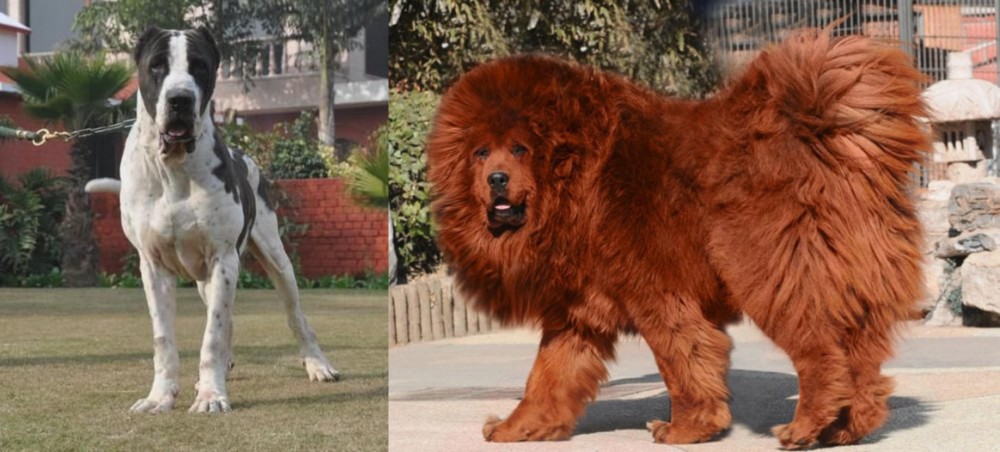 Both Bully Kutta and Himalayan Mastiff are originated from India. Bully Kutta may grow 18 cm / 8 inches higher than Himalayan Mastiff. Bully Kutta may weigh 12 kg / 27 pounds more than Himalayan Mastiff. Bully Kutta may live 3 years less than Himalayan Mastiff. Both Bully Kutta and Himalayan Mastiff has same litter size. Bully Kutta requires Low Maintenance. But Himalayan Mastiff requires Moderate Maintenance
Both Bully Kutta and Himalayan Mastiff are originated from India. Bully Kutta may grow 18 cm / 8 inches higher than Himalayan Mastiff. Bully Kutta may weigh 12 kg / 27 pounds more than Himalayan Mastiff. Bully Kutta may live 3 years less than Himalayan Mastiff. Both Bully Kutta and Himalayan Mastiff has same litter size. Bully Kutta requires Low Maintenance. But Himalayan Mastiff requires Moderate Maintenance
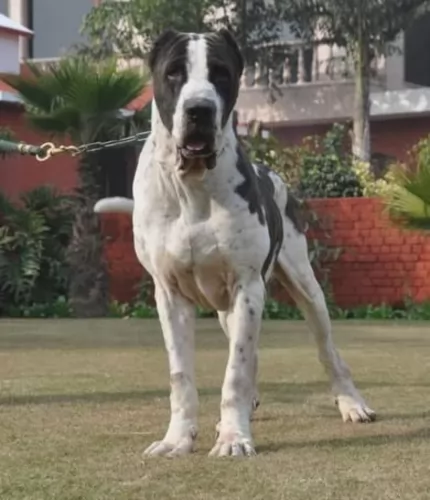 This well built, powerful dog breed is also known as Indian Alangu Mastiff or Pakistani Mastiff. These dogs come from the Punjab and Sindh region of the Indian subcontinent. It is believed that mastiff dogs came with British soldiers during the British invasion, however English Mastiffs, Bulldogs, Bull Terriers and Great Danes are seen as potential ancestors of this large dog.
This well built, powerful dog breed is also known as Indian Alangu Mastiff or Pakistani Mastiff. These dogs come from the Punjab and Sindh region of the Indian subcontinent. It is believed that mastiff dogs came with British soldiers during the British invasion, however English Mastiffs, Bulldogs, Bull Terriers and Great Danes are seen as potential ancestors of this large dog.
There are disputes about the country of origin of this breed, and some people claim that the dog comes from India, while others say it comes from Pakistan. Certainly in Pakistan these dogs are still used for fighting.
 The Himalayan Mastiff or Tibetan Mastiff is an ancient breed. Bred to be guardians of the flock, they could take care of leopards and wolves or anything else that tied to hurt the flock. The Himalaya Mastiff is found in the Himalayan area of Tibet. They are descendants of the Tibetan dogs that developed almost any Mastiff or Molosser on earth. They may have been in the mountains since the early 1100 BC. and have been fairly isolated. It was in this isolation that the Himalayan Mastiff developed.
The Himalayan Mastiff or Tibetan Mastiff is an ancient breed. Bred to be guardians of the flock, they could take care of leopards and wolves or anything else that tied to hurt the flock. The Himalaya Mastiff is found in the Himalayan area of Tibet. They are descendants of the Tibetan dogs that developed almost any Mastiff or Molosser on earth. They may have been in the mountains since the early 1100 BC. and have been fairly isolated. It was in this isolation that the Himalayan Mastiff developed.
Their function at that time was mostly to guard property. In some circumstances an entire village is guarded by one dog. It was also during this period that the breed was taught to be aggressive by tying them up as puppies. They guarded families while the men moved the village flock higher up in the mountains. They stayed in isolation until the mid-1800’s when the Queen of England was given a Himalayan Mastiff. For thousands of years, this dog was a nomad.
Soon the breed was being exported to England. A standard was developed, and the British began to breed them. Next, they were exported to Nepal, Afghanistan, India and the United States. They are rare in Tibet these days but more popular than ever in England and the United States. The first American Himalaya Tibetan Mastiff Association came into being in 1974 and in 2006 it was recognized by the AKC.
Today in the West, the Himalayan is a domesticated, family dog. It hardly fits in an apartment of course. These new western Himalayan Mastiffs are more easy- going than the Tibetan ones, but they are still wary of strangers and somewhat aloof. They are also still very protective and nocturnal. They are smart, independent and stubborn. They are not easy to train but socialization and obedience training is essential.
A study done in 2011 showed that it is very likely that many large breed dogs were descended from this Mastiff. This includes the St. Bernard, the Rottweiler, Bernese Mountain Dog and the Great Pyrenees. Later studies showed that the Mastiff’s ability to survive in the rare air of the Himalayans was due to interbreeding with Tibetan wolves in ancient, prehistoric times. Now they are competing in the Westminster Kennel Club Dog Show.
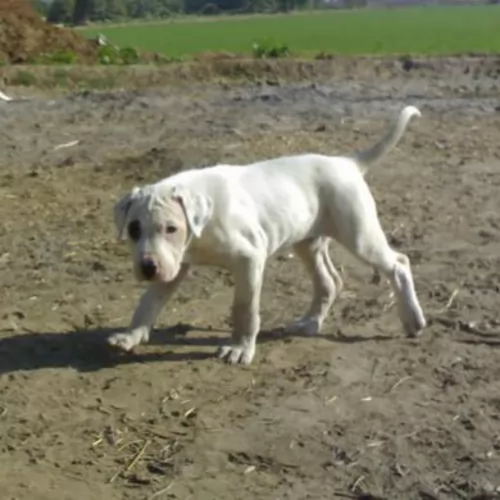 The Bully Kutta is a big, heavy, muscular dog, standing at roughly 81 – 89cm and weighing in at 70–90kg. He isn’t particularly good with children or with other pets simply because the dog is aggressive by nature. If you do opt for this large breed, you’re going to need a large garden and he is going to require a lot of exercise.
The Bully Kutta is a big, heavy, muscular dog, standing at roughly 81 – 89cm and weighing in at 70–90kg. He isn’t particularly good with children or with other pets simply because the dog is aggressive by nature. If you do opt for this large breed, you’re going to need a large garden and he is going to require a lot of exercise.
This is a dog breed that is going to require socialization and training if you want him to be obedient and calm, as he is inclined to be a dominating breed. He’s an intelligent dog and when well trained, he makes a splendid pet with firm, fair owners.
The Bully Kutta has a large, broad head which is supported by a thick well-muscled neck. The skin around his lower jaw is loose. The ears are short, set high and are mostly cropped, but other times they are left to flop over. The tail is sometimes docked but these days mostly left long and tapered.
He has a short smooth coat and is essentially white in color although the coat can also be fawn, brown, black or brindle.
 The Himalayan Mastiff is a giant, massive dog longer than it is tall. The breed has a heavy, broad head and square muzzle. They have black noses, a level bite and almond shaped, slanted, deep set eyes. They are brown, and the ears hang close to the head. They are heavy, muscular and sturdy. They have a feathered tail curving over their back. With a heavy, thick double coat and mane they resemble a lion at times. The coat can be brown, black, and gray-blue with gold or tan markings. These are impressive and noble dogs, athletic, with cat like feet. They are agile and light on their feet.
The Himalayan Mastiff is a giant, massive dog longer than it is tall. The breed has a heavy, broad head and square muzzle. They have black noses, a level bite and almond shaped, slanted, deep set eyes. They are brown, and the ears hang close to the head. They are heavy, muscular and sturdy. They have a feathered tail curving over their back. With a heavy, thick double coat and mane they resemble a lion at times. The coat can be brown, black, and gray-blue with gold or tan markings. These are impressive and noble dogs, athletic, with cat like feet. They are agile and light on their feet.
According to some breeders there are two different kinds or types of Himalayan Mastiff. These are the Tsang-khyi or the monastery mastiff type and the Do-khyi or the nomad mastiff type. The monastery is a heavier, taller dog who face is very wrinkled while the nomad is a leaner dog with less facial wrinkles. In any litter there can be both kinds. The kind of work that was given to each dog was dependent on their type. The Monastery kind is given stationary jobs and the nomad kind got the active jobs.
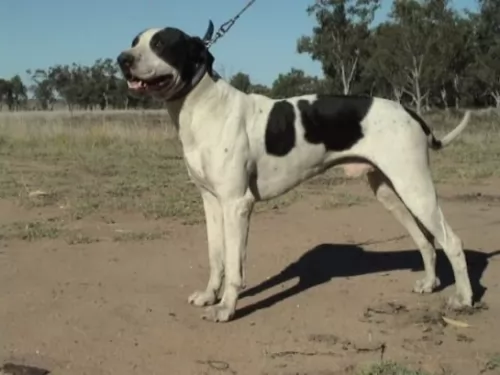 The Bully Kutta is a powerful, imposing dog and they have been nicknamed the ‘Beast from the East’. Unfortunately it is this dog’s thick bones, his looks and his strength that have him used for cruel dog fighting in Pakistan.
The Bully Kutta is a powerful, imposing dog and they have been nicknamed the ‘Beast from the East’. Unfortunately it is this dog’s thick bones, his looks and his strength that have him used for cruel dog fighting in Pakistan.
When not used for fighting, he makes a loyal, devoted companion for the owner who ensures proper socialization and training. Well raised Bully Kuttas are then good with children, being loving, protective and playful.
One just hopes that the future of this giant dog breed is brighter, and that he will be looked upon as more of a companion that just a dog-fighting object to bring in money for his owner.
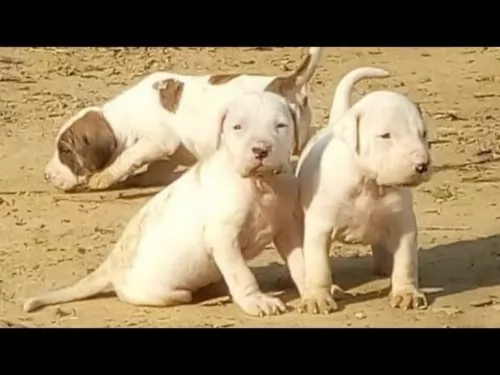 Your Bully Kutta is generally a healthy dog and not often affected by hereditary diseases, but with giant breeds such as this you will have to look out for diseases common to large dogs.
Your Bully Kutta is generally a healthy dog and not often affected by hereditary diseases, but with giant breeds such as this you will have to look out for diseases common to large dogs.
Typical illnesses to watch out for will include hip dysplasia, arthritis, skin allergies and bloat.
This is an inherited condition where the hip joint is improperly formed. For your Bully Kutta it causes wear and tear as well as stiffness in the hips and your dog battles to rise after lying down.
Arthritis in your dog can be managed but it can cause a lot of discomfort for him. This inflammation of the joints can cause pain and stiffness. It is more often seen in older dogs. It can also start at an early age because of problems with bone and joint development and abnormal rubbing within the joint.
Today there are a number of therapy options that can bring some kind of relief to your dog.
 Being a large breed of canine, the Himalayan Mastiff has some of the typical health issues of large dogs. However, they also face a serious genetic disorder as well.
Being a large breed of canine, the Himalayan Mastiff has some of the typical health issues of large dogs. However, they also face a serious genetic disorder as well.
Canine Inherited Demyelinative Neuropathy (CIDN) – a fatal disorder seen in puppies by seven weeks of age. Puppies die before they are 5 months old.
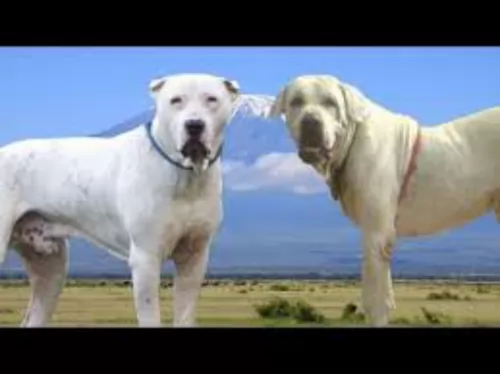 The short coat is low maintenance and as a moderate shedder too, all that is required really is to give your Bully Kutta a good brush twice a week to keep the coat in good condition.
The short coat is low maintenance and as a moderate shedder too, all that is required really is to give your Bully Kutta a good brush twice a week to keep the coat in good condition.
Brush his teeth 2 or 3 times a week with special canine-toothpaste and toothbrush to prevent plaque build-up. He’s a drooler too, so you will need to wipe his face and maybe your clothes of slobber from time to time.
This strong, muscular dog of yours will require an excellent diet. It’s always wonderful if you can give him home-made food such as vegetables, rice and meat. These days you get excellent commercially manufactured food for dogs, and your vet can advise you on the best food for a large, active dog such as the Buly Kutta.
Raw meat is absolutely essential for your dog from time to time and will ensure that his coat doesn’t become dull and with bald spots. Remember, that before dogs were domesticated they used to live on raw meat, so see that he gets some raw meat to prevent skin disorders. Make sure your large pet has a constant supply of fresh, cool water.
Bully Kuttas are going to need a walk every day in the form of exercise. If he is socialized you can take him into the park for ball games. He is a dog that will require plenty of space.
 This breed will eat less than you think they should but don’t overfeed. Puppies need a solid dry food for large dogs. You can free feed 1 cup three times per day.
This breed will eat less than you think they should but don’t overfeed. Puppies need a solid dry food for large dogs. You can free feed 1 cup three times per day.
For dogs over a year old you can free feed anywhere from two to four cups of dry food per day. Unlike many other breeds, the Himalaya Mastiff will only eat when hungry and they may not eat more than once a day. They will not overeat. The males might not eat at all when females are in season if they are around them.
They have good strength and athletic ability.
The Himalayan Mastiff needs regular, routine walks. It is important during these walks that the human leads the way, or the dog heals. Do not overwork a young Himalayan Mastiff. They need work related jobs like structured play time, walking the boundary of their territory, playing frisbee or catch. They work and play in short bursts then rest.